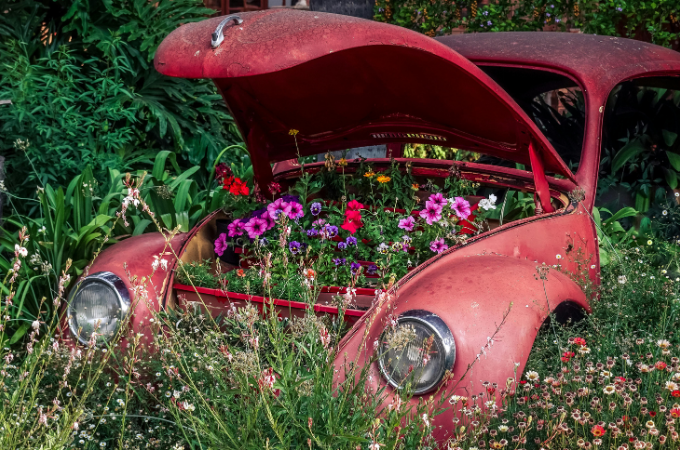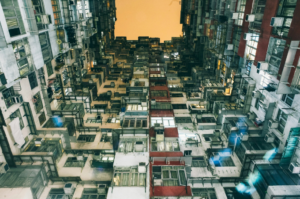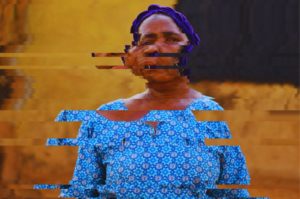
i.
My father doesn’t like me. I know it because every time I stare into his eyes, I see this deep feeling of regret. He tells me countlessly that I am like my mother, the wife who abandoned him a few weeks after my birth.
My father doesn’t like me and I know it. He never drives me around town in his Volkswagen or takes long walks with me like the other fathers do with their children. He lets me stay in the house all day and only allows me to leave when it is time for school.
When he comes back from work, he heads straight to the bar and knocks himself out. Later, he stares at me with drunken hateful eyes. He sits me down and bores me with tales of his short-lived marriage with my mother and how I remind him so much of a relationship that was doomed from the start. He narrates to me how I brought misfortune in his life. I cry and stare out to the sky every night and wonder what I have done to be stripped of all the love the world can give.
Many times, he holds up the letter my mother left him, as if I needed more proof that my mother is not here. I read it once though.
Abdul,
Sorry I have to leave, but I hope that you will learn how to pick up the broken pieces of your heart, and move on.
That you will learn to make lemonade with the lemons life gives you. That you will learn that sometimes in life, we have to run away from our problems.
That you will learn to love again.
– Zara
My grandmother never liked him but since he was in love with my mother, he ignored her. But love had not been enough because after I had been born, my mother looked him in the eye and told him that her instincts had told her she’d never make a good mother. He had thought it was a phase she’d pass but he got the surprise of his life when she left.
You see, life decides everything for you before you are born. It decides your family, your friends and even your religion. You don’t even get to choose your name, surname or family’s social status because everything has been picked for you. You only grow with a certain unconsciousness of your personality until one day, you start to realize who you are and the startling reality life brings to you. In my case, I realized early enough that my fate was one of an unwanted daughter who would bear the sins of her mother for life.
ii.
This morning, I wake up with a tired feeling clogged in my chest. It’s the feeling of exasperation, of languidness, of wanting to leave the toxic environment I am living in. My days are horrid and this startling reality stares at me in my face. Today is the day I decide to leave home.
I stare at the fading paints and inhale the faint smell of iru from the kitchen which sits close to my room. The radio is on commercial break and I faintly hear Fela Kuti’s “Shakara” playing in the living room.
The pain in my chest gnaws again as I remember my reality – I will always remain the child of his estranged lover who left him without a word. I get up, get dressed, pack my bags and head for the train station.
At the train station, everyone moves without a care in the world. Some people queue close to a telephone stand. I see a street peddler carrying his wares. I fumble with my bags as the attendant at the ticket office asks for the umpteenth time where I am headed. I want to tell her that I don’t know. That I am running away to start life in a new place. But I don’t, I look at her and tell her that I’m headed for Maiduguri. She nods, stamps my ticket and gives it to me as I pay.
I sit on the train and stare at the sky through the window, noting the hues of orange splattered on the evening blue sky. It’s mid-December and the harmattan is at its peak. As the wind blows through my hair, a rattling awareness of how lonely I am dawns on me. I realize how it’s only me against the world. For the first time in many years, I weep.
I weep for the years I’d wasted expecting my father to love me or the countless times my father had looked at me with hate filled eyes.
“A penny for your thoughts,” I hear someone say. I turn and, for the first time, realize that there is a man seated next to me. The man beside me is dressed in a loosely fitted kaftan. I watch the little incision scars on his face widen as he smiles at me. His eyes glow with warmth and they remind me of the mariner with the glowing eye from S. T. Coleridge’s The Rime of the Ancient Mariner. I smile in response. “My name is Jamil,” he states. “What’s yours?”
“Ene,” I reply.
Jamil and I hit it off faster than I have done with anyone in my life. We spend the next few hours talking. He speaks of Homer’s The Odyssey and the Greek gods from the Olympian myths he has read. He tells me how he has lived in Kano all his life and now, plans to relocate to Maiduguri and begin life afresh. I realize in that moment that I will not be alone for the rest of the journey. I have found a cheerful travel companion.
When Jamil asks about my family, I do not hide the truth from him. I tell him everything with tears in my eyes and how I’m headed to Maiduguri without a place in mind. For the longest time as I talk, Jamil sits and listens without interrupting me. When I am done, he doesn’t say a word, rather he taps his fingers on his lap and stares blankly at the sky – his defense mechanism against worry as I’ll later come to realize. He stops tapping his fingers and stares at me.
For the first time in my life, I find someone who is genuinely concerned about me.
iii.
Jamil and I get married the next year at the registry and we make our home in the eastern part of the city. The first months of our marriage are the happiest moments of my life. Every evening, Jamil returns home from work to me every evening with a tired, satisfied smile. He tells me how lucky he is to have married me. On Sunday evenings, we take long walks on the streets and we talk about life, our joys and share our deepest fears. For the first time in my life, I know what it means to be loved and accepted.
A year later, Jamil dies in an accident and the grief of his death cuts deep into me in ways I never imagined. Everyday feels the same – the same agony, the same tears, the same pain. Every day, I sit on the bed and stare blankly into space, hoping he’ll come into the room and tell me I am wrong about his death. But he doesn’t, and for the next few weeks I realize that this haunting feeling will be my reality from now on.
I grieve for as long as I can. I grieve so deeply that I do not realize the early morning sickness or that I’m yet to see my period. One day, after I pass out, I wake up in the hospital with the nurse telling me the news I least expect to hear.
I am pregnant. I had been pregnant before Jamil died.
This awareness shatters me in so many ways. Like my father, it means I will be stuck with a child that will remind me of my partner. History is repeating itself.
As the days go by, I worry about what this pregnancy is doing to me. Every day, I struggle with morning sickness and the constant fear of the pain of childbirth. Like my mother, I am scared of what I will become when this child is born. Will I be a good mother or shirk the responsibility that comes with motherhood?
iv.
I stare at the falling guava leaves in my father’s compound. After years of being away, I am back to where I left but everything has changed. The gardener tells me my father died two months ago and has been buried. I do not believe him, not until I see his grave.
I stare at the wall to see that the yellow paint has faded and the grass has overgrown. I want to scold the gardener for slacking at his job but I decide against it. He has not been paid and has been waiting for my return.
A tear slips from my eye and I let it fall. I have never thought I would ever cry over my father’s passing. Not until now. I don’t know if I’m in pain because of my father’s death or the way my life turned out.
“What killed him?” I ask, still staring at the grave.
“Tuberculosis,” he replies.
“Did he ever look for me?” I ask. “I mean, my father.”
He shakes his head to indicate no, and a pain cuts deep into my heart.
“And my mom, did she ever come back?”
He shakes his head again to say no.
I stare at the graveyard and smile faintly. I think of Jamil and our short-lived marriage while I stare at our daughter, Asabe who stirs in my arms and yawns softly. I adjust the shawl over her body and stare at her face to see the striking resemblance of Jamil. I feel this intense love within me as I stare at her. This child will never get to see her father or grandparents but she has me and I will give her the love I never received. My mother has left her legacy and it is up to me to stick with the status quo or make a change. And I decide to stay, and protect her against the cold world and make sure she gets everything she needs.
I pause for a while and mull over the twenty-two years of my life. The love I craved for never came from the people I expected. Rather, it came from a random stranger on the train. I ask myself if I made the right choice by leaving my father but when I remember I met Jamil and found the love I’d been denied all my life, I am at peace with my decision. At least, I have been loved.
The night slowly creeps in. It begins to drizzle and Asabe begins to cry. A drop of rain touches my face and before I scurry into the house, I stare at my father’s grave and the now battered and rusted Volkswagen.
Photo by Magda Ehlers from Pexels










Ruth January 09, 2025 08:14
Beautiful piece, really.